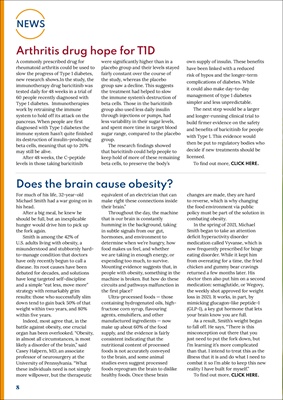
8
NEWS
Arthritis drug hope for T1D
A commonly prescribed drug for
rheumatoid arthritis could be used to
slow the progress of Type 1 diabetes,
new research shows.In the study, the
immunotherapy drug baricitinib was
tested daily for 48 weeks in a trial of
60 people recently diagnosed with
Type 1 diabetes. Immunotherapies
work by retraining the immune
system to hold off its attack on the
pancreas. When people are first
diagnosed with Type 1 diabetes the
immune system hasn't quite finished
its destruction of insulin-producing
beta cells, meaning that up to 20%
may still be alive.
After 48 weeks, the C-peptide
levels in those taking baricitinib
were significantly higher than in a
placebo group and their levels stayed
fairly constant over the course of
the study, whereas the placebo
group saw a decline. This suggests
the treatment had helped to slow
the immune system's destruction of
beta cells. Those in the baricitinib
group also used less daily insulin
through injections or pumps, had
less variability in their sugar levels,
and spent more time in target blood
sugar range, compared to the placebo
group.
The research findings showed
that baricitinib could help people to
keep hold of more of these remaining
beta cells, to preserve the body's
own supply of insulin. These benefits
have been linked with a reduced
risk of hypos and the longer-term
complications of diabetes. While
it could also make day-to-day
management of type 1 diabetes
simpler and less unpredictable.
The next step would be a larger
and longer-running clinical trial to
build firmer evidence on the safety
and benefits of baricitinib for people
with Type 1. This evidence would
then be put to regulatory bodies who
decide if new treatments should be
licensed.
To find out more, CLICK HERE.
Does the brain causes obesity?
For much of his life, 32-year-old
Michael Smith had a war going on in
his head.
After a big meal, he knew he
should be full, but an inexplicable
hunger would drive him to pick up
the fork again.
Smith is among the 42% of
U.S. adults living with obesity, a
misunderstood and stubbornly hardto-manage
condition that doctors
have only recently begun to call a
disease. Its root causes have been
debated for decades, and solutions
have long targeted self-discipline
and a simple "eat less, move more"
strategy with remarkably grim
results: those who successfully slim
down tend to gain back 50% of that
weight within two years, and 80%
within five years.
Indeed, most agree that, in the
battle against obesity, one crucial
organ has been overlooked. "Obesity,
in almost all circumstances, is most
likely a disorder of the brain," said
Casey Halpern, MD, an associate
professor of neurosurgery at the
University of Pennsylvania. "What
these individuals need is not simply
more willpower, but the therapeutic
equivalent of an electrician that can
make right these connections inside
their brain."
Throughout the day, the machine
that is our brain is constantly
humming in the background, taking
in subtle signals from our gut,
hormones, and environment to
determine when we're hungry, how
food makes us feel, and whether
we are taking in enough energy, or
expending too much, to survive.
Mounting evidence suggests that, in
people with obesity, something in the
machine is broken. But how do these
circuits and pathways malfunction in
the first place?
Ultra-processed foods - those
containing hydrogenated oils, highfructose
corn syrup, flavouring
agents, emulsifiers, and other
manufactured ingredients - now
make up about 60% of the food
supply, and the evidence is fairly
consistent indicating that the
nutritional content of processed
foods is not accurately conveyed
to the brain, and some animal
studies even suggest processed
foods reprogram the brain to dislike
healthy foods. Once these brain
changes are made, they are hard
to reverse, which is why changing
the food environment via public
policy must be part of the solution in
combating obesity.
In the spring of 2021, Michael
Smith began to take an attention
deficit hyperactivity disorder
medication called Vyvanse, which is
now frequently prescribed for binge
eating disorder. While it kept him
from overeating for a time, the fried
chicken and gummy bear cravings
returned a few months later. His
doctor then also put him on a second
medication: semaglutide, or Wegovy,
the weekly shot approved for weight
loss in 2021. It works, in part, by
mimicking glucagon-like peptide-1
(GLP-1), a key gut hormone that lets
your brain know you are full.
As a result, Smith's weight began
to fall off. He says, "There is this
misconception out there that you
just need to put the fork down, but
I'm learning it's more complicated
than that. I intend to treat this as the
illness that it is and do what I need to
combat it so I'm able to keep this new
reality I have built for myself."
To find out more, CLICK HERE.